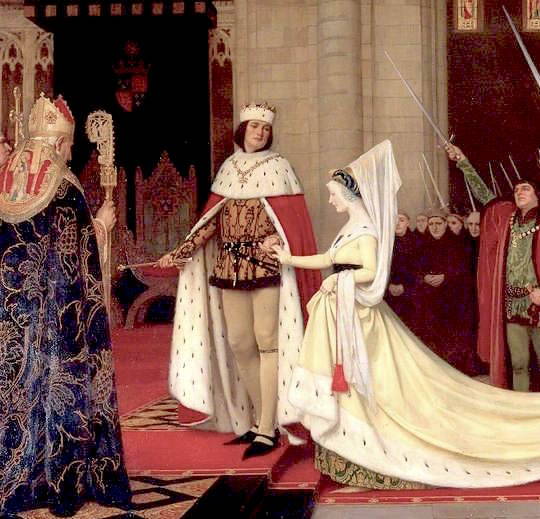 |
| Edward IV and Queen Elizabeth |
Thou, Elizabeth, art here;
Thou to whom all griefs were known;
Who wert placed upon the bier
In happier hour than on the throne.
Fatal daughter, fatal mother,
Raised to that ill-omen’d station,
Father, uncle, sons, and brother,
Mourn’d in blood her elevation!
Woodville, in the realms of bliss,
To thine offspring thou may’st say,
Early death is happiness;
And favour’d in their lot are they
Who are not left to learn below
That length of life is length of woe.
Lightly let this ground be prest;
A broken heart is here at rest.
Queen Dowager Elizabeth died on 8 June 1492, at Bermondsey Abbey, aged 55. Here is an account of her death:
Elizabeth died at Bermondsey Abbey nearly two months after making her will, on Friday 8 June 1492. Her body was conveyed by boat to Windsor on Whit Sunday, 10 June… accompanied by Prior Ingilby, Dr Brent, Edward Haute, her second cousin, and two gentlewomen, one of them her husband’s illegitimate daughter, Grace. The wooden coffin was taken ‘prevely’ (privately or secretly) from the Thames to the Castle and was received there at eleven at night by a single priest and a clerk. There was no ringing of bells nor formal reception by the dean and canons of St George’s Chapel, and she seems to have been interred almost immediately without any form of ceremony. The Marquess of Dorset, his half-sisters Anne, Catherine and Bridget, Edmund de la Pole (the slain Earl of Lincoln’s brother) and other relatives reached Windsor on Tuesday, and that evening the Bishop of Rochester conducted the services of dirige and requiem mass. The Queen was prevented from attending by her impending confinement; but the King, and other senior peers and churchmen were all conspicuous by their absence, and one of the heralds present was shocked by the general modesty of the proceedings. His comment that ‘ther was nothyng doon solemply for her savyng a low herse suche as they use for the comyn people with iiij wooden candilstikks abowte hit’ and that there was ‘ther never a new torche, but old torches, nor poure man in blacke gowne nor hoods, but upon a dozeyn dyvers olde men holdyng old torches, and torches ends’ requires no elaboration, and it is unclear why the Dean of Windsor, who was present, played no part in the services himself. It is sometimes suggested that Elizabeth had requested a simple and inexpensive funeral out of a deep sense of piety and that was accordingly what she was given: but she would have been aware that a deceased’s estate normally bore these expenses, and that queenly obsequies were beyond her means. Elizabeth may have thought of piety in terms of poverty, although few great noblewomen would have chosen austerity or thought money and their faith incompatible... Requests for a modest funeral were a mark of humility, largely ignored by contemporaries who felt that the deceased should be buried in accordance with his or her rank in society, and it is difficult to believe that she who had once been Queen of England had insisted upon this dismal and unqueenly ending. Be that as it may, in the course of her life Elizabeth had mourned the deaths of all five of her brothers, all but one of her seven sisters, four of her five sons and two of her daughters, and she may have felt that there was little to detain her in this world when her own time came. (Read more,)Share

















No comments:
Post a Comment